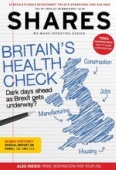Archived article
Please note that tax, investment, pension and ISA rules can change and the information and any views contained in this article may now be inaccurate.
Who benefits as big brands shun YouTube?

The revelation that many mainstream advertisers had seen their brands sit next to extremist content on Google-owned YouTube has sparked an exodus from the online video sharing platform.
The likes of Johnson & Johnson and AT&T in the US and Marks & Spencer (MKS) and HSBC (HSBA) in the UK have all pulled ads from the site in response to what the US Association of National Advertisers is calling a ‘crisis’.
Boon for broadcasters
There are two main beneficiaries of this debacle. Most prominently, broadcasters such as our Top Pick for 2017 ITV (ITV) could profit from a shift back to more traditional forms of advertising such as television.
TV remains a very effective means of advertisers getting a message across to consumers.
Critically it is more transparent than online advertising where there are growing fears that advertisers are, in some cases, essentially being defrauded or their message is seen alongside under-vetted content.
Liberum analyst Ian Whittaker, who has a ‘buy’ recommendation on ITV with a 340p price target, says there are two ways the free-to-air broadcaster can capitalise on YouTube’s woes.
‘Advertisers (can) shift money back towards traditional media including TV (and ITV),’ he says. ‘ITV can also push its online video advertising as a safe offering to clients who will know that their adverts will not appear alongside extremist material.’
Agencies back in demand
The world’s largest advertising business WPP (WPP) is down 12% since 3 March when it published an underwhelming set of full year results and downbeat guidance for 2017.
Buy into this share price weakness as the YouTube situation adds to our positive long-term view of WPP.
Historically agencies have made a lot of money by purchasing advertising space both online, in print and on the airwaves.
There have been fears that either advertisers would cut out the middle man and deal directly with the likes of Facebook and Google or use programmatic buying, the automated purchase of unsold space on websites, to snap up ad space online.
Taking agencies and some element of quality control out of the equation clearly risks compromising the brand by associating it with extremist or offensive content.
A 2014 report by Millward Brown suggested brands account for more than 30% of the market cap of companies on the S&P 500 index of large US companies. Given the value of brands, it is not worth the risk for the really big companies to dispense with the agencies’ expertise.

Time to buy ITV at 209.1p and WPP at £16.78. (TS)
Important information:
These articles are provided by Shares magazine which is published by AJ Bell Media, a part of AJ Bell. Shares is not written by AJ Bell.
Shares is provided for your general information and use and is not a personal recommendation to invest. It is not intended to be relied upon by you in making or not making any investment decisions. The investments referred to in these articles will not be suitable for all investors. If in doubt please seek appropriate independent financial advice.
Investors acting on the information in these articles do so at their own risk and AJ Bell Media and its staff do not accept liability for losses suffered by investors as a result of their investment decisions.
Issue contents
Big News
Feature
Great Ideas Update
Investment Trusts
Larger Companies
Main Feature
Smaller Companies
Story In Numbers
- Most popular exchange-traded funds in March 2017
- Best performing stocks in FTSE All-Share Index so far this year
- Hurricane may be sitting on ‘largest undeveloped discovery’ in North Sea
- 12.5%: Percentage of Lloyds’ loans deemed ‘high-risk’
- $54.7bn: Netflix’s blockbuster value creation
- Watkin Jones family and directors cash in £70m worth of stock
- 80: A rare ‘buy the market’ alert has been sounded for US equities
- £1m: Acacia’s daily hit from export ban
 magazine
magazine









